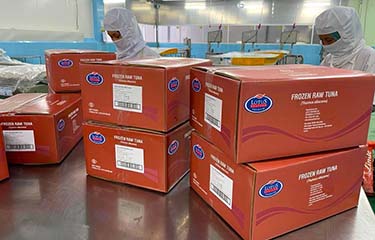Lotus Seafood develops proprietary treatment for tuna, opens plant in Indonesia

Oceanside, California, U.S.A.-based Lotus Seafood is opening a new processing plant in Indonesia that will implement a proprietary treatment for tuna that enhances coloration without the use of carbon monoxide (CO).
Because it can hide degradation of fish quality, CO-treated tuna is banned by Japan, the E.U., and Canada, though it is still allowed in the United States.
“It’s just a question of two years or five years of when it will be shut down in the U.S.,” Lotus Seafood CEO Nick Ovchinnikov told SeafoodSource at the 2023 Seafood Expo North America. “The industry is struggling to find an alternative, because if you don’t treat it, it can lose its appeal, especially in sashimi presentations.”
The treatment process, which was invented in Japan and tweaked over the past three years by Lotus, involves the use of vitamins and antioxidants, including vitamin C. Besides enhancing coloration, it also preserves flavor, according to Ovchinnikov.
“The treatment preserves the natural color of tuna perfectly, and it’s stable after freezing and after thawing,” Ovchinnikov said.
Ovchinnikov said Lotus is one of the top five tuna importers to the U.S., and one of the only U.S. tuna importers that does not use CO-tuna, according to Ovchinnikov. It had around USD 100 million (EUR 92 million) in sales in 2021 and counts major retail and foodservice accounts nationwide as buyers.
Built with a local partner, the company’s new oceanside processing plant in Papua, Indonesia, cost USD 10 million (EUR 9.2 million) and will have an annually capacity in excess of ...
Photo courtesy of Lotus Seafood




Share